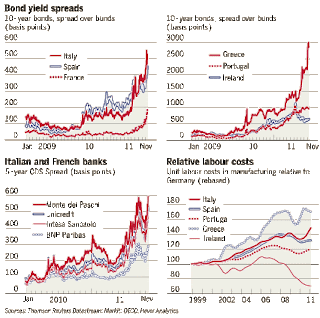Europe must not allow Rome to burn
El título y el dibujo lo dicen todo. Crecen las sospechas sobre las verdaderas intenciones de Merkel.
Wolf no le atribuye deseos imperiales, pero....
http://www.ft.com/cms/s/0/4c00d072-0f7e-11e1-a36b-00144feabdc0.html#ixzz1dod0Pd76
...So, when Germany’s Angela Merkel, chancellor of Europe’s most powerful state, calls “for Europe to build a ‘political union’ to underpin the euro and help the continent emerge from its ‘toughest hour since the second world war’” I take her seriously. I have little doubt, too, that the majority of the German business and political elite believes that the survival of the euro and of a united Europe is in the country’s interest. The question is whether they are prepared to pay the price....The greater the economic divergence within the eurozone, the greater the stresses. Unfortunately, divergences in competitiveness, before the crisis, and in the price of credit, after it, have been extreme (see charts).
Sí: Merkel se cree que está "gestionando" la crisis, pero su táctica de ir pasito a pasito, nos está llevando al disparadero. Como se ve claramente en los gráficos, que muestran cómo todo empeora mientras los países se ajustan para "provocar una subida de la productividad y de ahí un aumento de riqueza que subiría la demanda", dixit el ínclito F-Villaverde, como veíamos ayer.This, then, is where the postwar European project itself has arrived. On its fate hangs the European economy, the global banking system and perhaps the world economy.My interpretation of the actions of chancellor Merkel is that “just enough, just in time” is itself the strategy. In this way, she may hope, the German people will come round to doing more. In this way, too, she may expect, peripheral members will be brought into line. She will not allow things to get so bad that the eurozone collapses; but she will not give so much money that the backsliders slacken their efforts.Just enough, just in time has been too little too late. What was once a crisis in small peripheral countries has become a conflagration. Spreads on sovereign credit have reached the stratosphere (see charts). Worse, sovereign spreads now include some risk of a break-up.Mr Monti and Mr Papademos are, almost certainly, the last hope for successful reform and adjustment in their countries. While a failure by Greece would be a nuisance, one by Italy would be devastating. If Italy were forced to default, it might well elect a populist government set on exiting from the euro. If it did so, few would be safe, including France.Mr Monti is going to need a great deal of luck. He is also going to need an enormous amount of help, of three kinds: first, at least backstop financing for the rollover of sovereign debt, to the tune of nearly €1,000bn; second, profitable and dynamic external markets; and, finally, a credible strengthening of the political underpinnings of the union, sufficient to make a break-up inconceivable. All of these are going to depend on bold German decisions. They are also going to depend on the ECB. If it allows slow growth, let alone an outright recession, to grip the eurozone, the chances for big peripheral members are grim. Italy is not little Ireland. That should be obvious to everybody.The eurozone has fiddled until Rome itself started to burn. With the new government, it has what may turn out to be a last chance to put out the fire. Yes, it is conceivable that Italy would remain in the eurozone even after a default. But that cannot be likely. In any case, an Italian default would batter bond markets across the continent and banks across the world. The time for too little too late has passed. What is needed, instead, is “too much, right now”. Power brings responsibility. Germany alone has the power. It is up to it to exercise the responsibility.




No hay comentarios:
Publicar un comentario